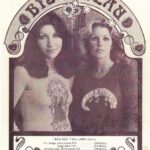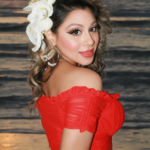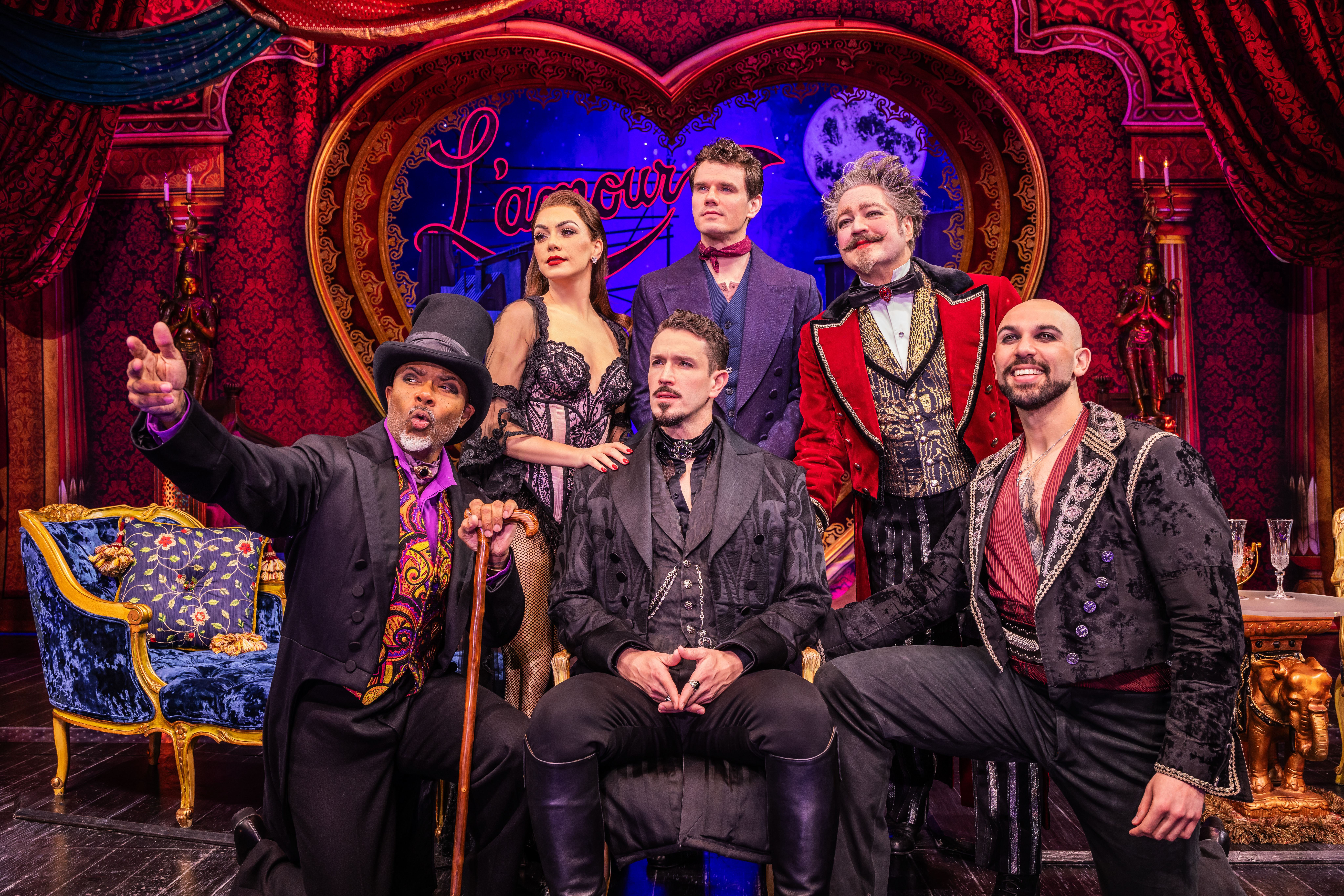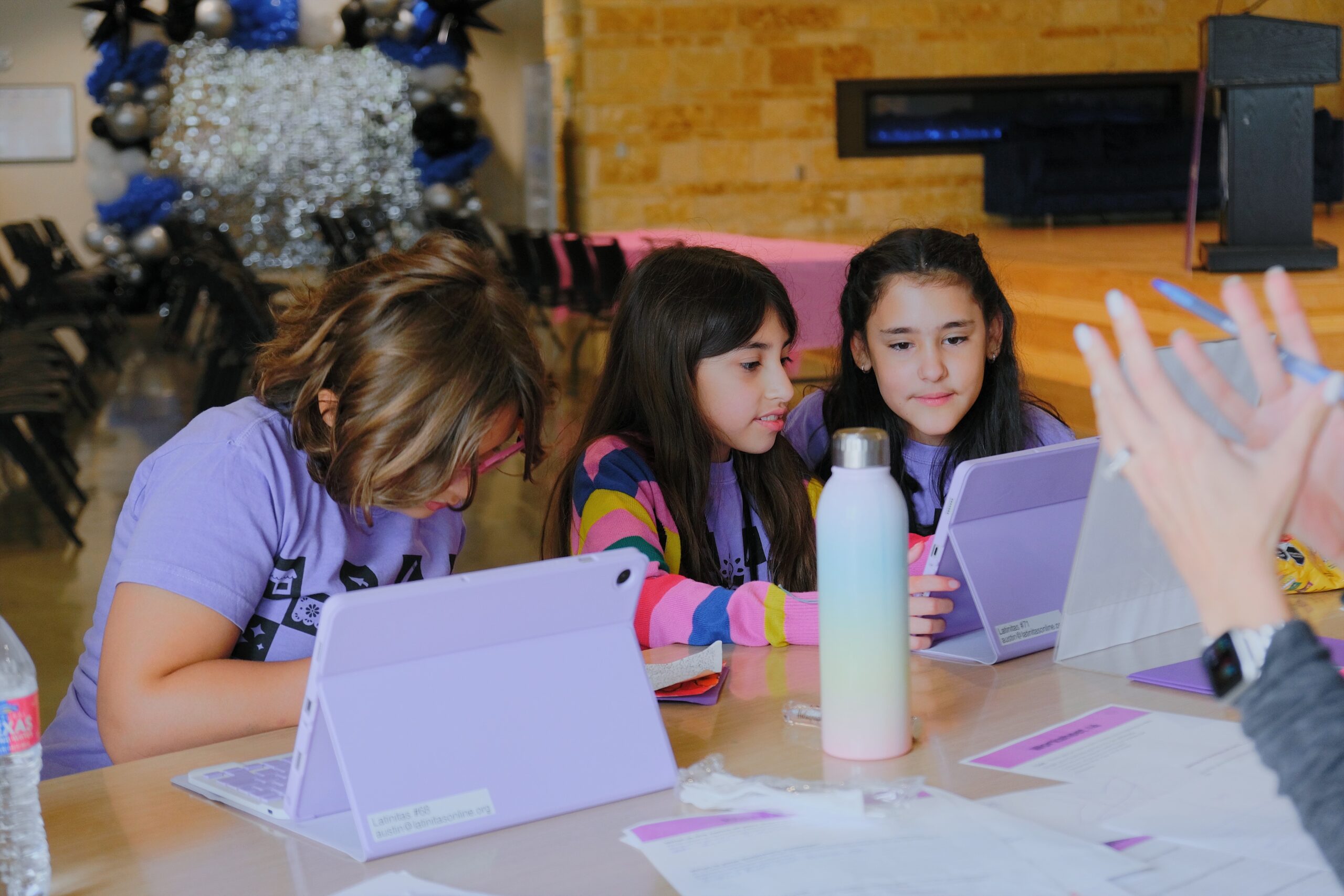This past weekend the streets surrounding the Texas Capitol were packed full of avid book readers, well-known authors, and established news outlets at the 27th annual Texas Book Festival. Originally founded in 1995 by Former First Lady and Librarian Laura Bush, the Texas Book Festival was established to help connect authors and readers as well as nurture Texans’ love of books. In the years since its inception, TBF has grown to as many as 300 authors, drawing in over 50,000 book lovers annually, and hosting over 120 panels throughout the weekend. The entire event is free and even has separate programs with panels for adults, teens, or children.
While there are plenty of events happening simultaneously, Day 2 for Latinitas Magazine began at 11 AM with a panel titled Girl Power: Perseverance Pays Off featuring Rebecca Balcárcel, author of “Shine On, Luz Véliz!”, and Saadia Faruqi, author of “Marya Khan and the Incredible Henna Party”. Moderator Andee Kinzy founder/director of the Girl Improved Film & Television Festival, started the panel off by asking the authors what girl power meant to them, “I think girl power just means that you have the freedom to develop everything about you. All the aspects about you,” Rebecca began, “I know in the Latino community sometimes girls are told they don’t really need to go to college, you know? Cause they’re just going to get married anyway and that’s really all they need to do. And I would say no! No, go to college. Do the things you’re going to do, develop your whole self… I hope our books do give examples of girls who are busy blossoming and growing and taking power and learning stuff.” In Rebecca Balcárcel’s book the main character Luz, for example, learns to code, as Rebecca wanted to show a Latina character in the STEM field.
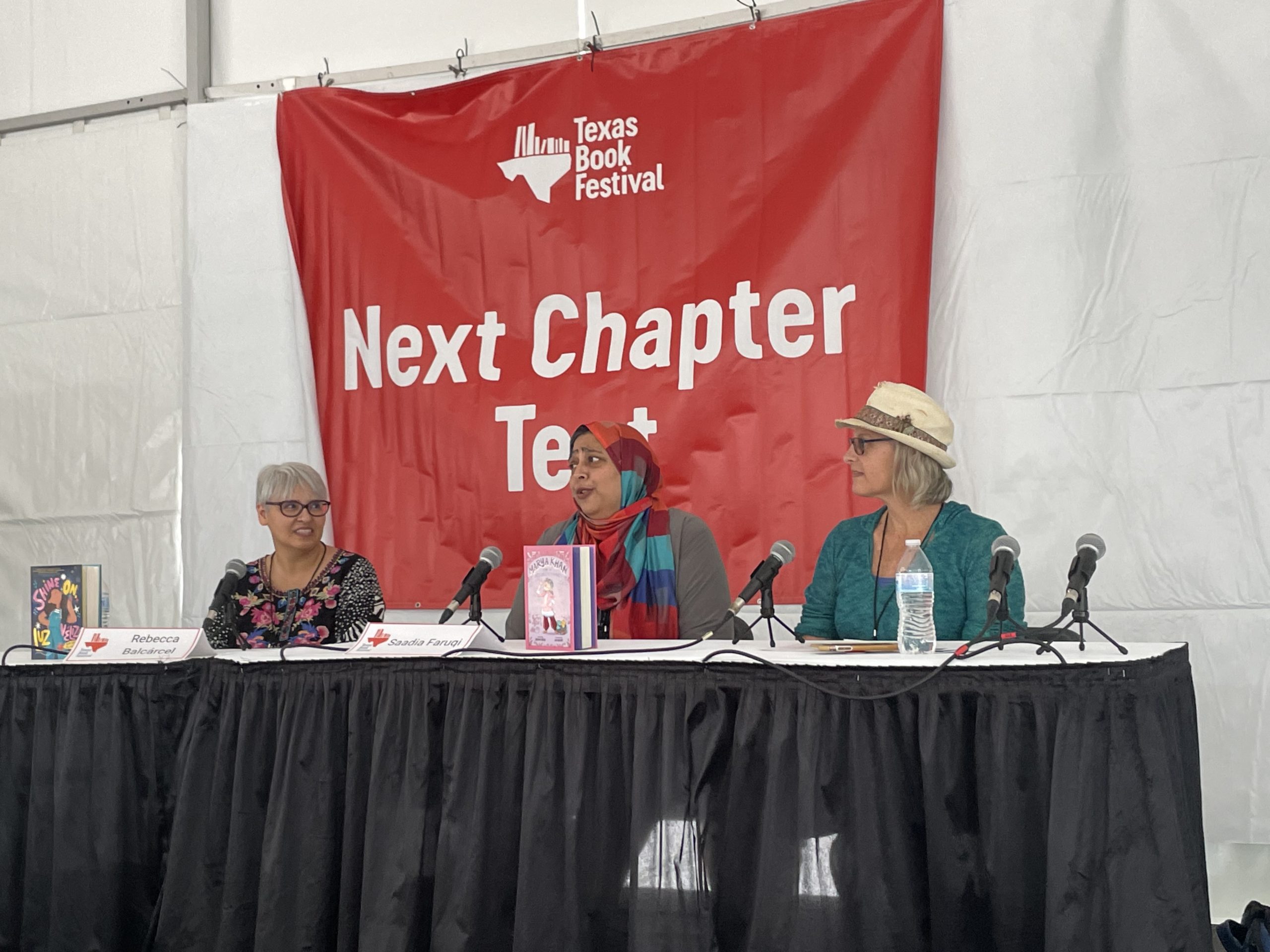
The Girl Power panel was the first in Sunday’s Children program and being that they were children’s books, Andee Kinzy asked the women why they decided to write for kids, “For me, I started out with my kind of claim to fame is the “Yasmin’ series,” Saadia Faruqi explains, “An early reader series and it’s very popular, but once you get past second grade you’re kind of done with it. You know, I didn’t want to lose my readers. I still want to write something for them, that they feel good about, that they feel seen, and see their culture. But also maybe if you’re not from my culture seeing somebody else from a lens that’s very authentic.” Saadia Faruqi was born in Pakistan and now resides in Houston, Texas, a city she absolutely adores due to its vibrant diversity.
Later in the panel, the women were asked to share a time when they needed to persevere, and boy did Saadia have a story, “I think for me the biggest disappointment when I came to the US was that my Bachelor’s degree was not accepted. I had to go back to school and literally do a Bachelor’s, three and four years, all over again. It was very disheartening. I mean I knew I had to do it because I couldn’t get any further than that if I was stuck with a degree that hasn’t been used. It wasn’t even that it was too hard, it was too easy. I mean I was telling my mother just yesterday that I literally never opened a textbook in those three years ’cause I’d studied everything before–except US History or something like that…” And on that note, Rebecca added, “When you all see roofers in Texas, like all summer hammering. Some of those people have PHDs. Some of those people taught economics at the University De San Carlos in Guatemala City like my uncle. Folks come to this country, and they may have whatever job, but they may be very educated in their own country.”
When the panel was over Rebecca and Saadia headed toward the Children’s Book Signing Tent for a book signing open to the public. The books were available in a smaller tent labeled BookPeople Children’s Sales Tent nearby.
Up next was a teen panel titled Fierce Reads: YA Buzz Books. Each of the authors on the panel were promoting newly released books, all of which, minus one, were reimaginings of classic literature stories. Joan He’s book “Strike The Zither” was a retelling of the well-known Chinese story “The Three Kingdoms”, nonbinary and bigender author Anna-Marie McLemore’s new release “Self-Made Boys” imagines what “The Great Gatsby” would be like if both he and Nick were trans men, and Goldy Moldavsky’s story “Lord of the Fly Fest” asks the question what if “Lord of the Flies” and Fyre Fest collided? Meanwhile, Judy I. Lin was there to promote the last installment of her duology “A Venom Dark and Sweet” on top of acting as the moderator for the panel.
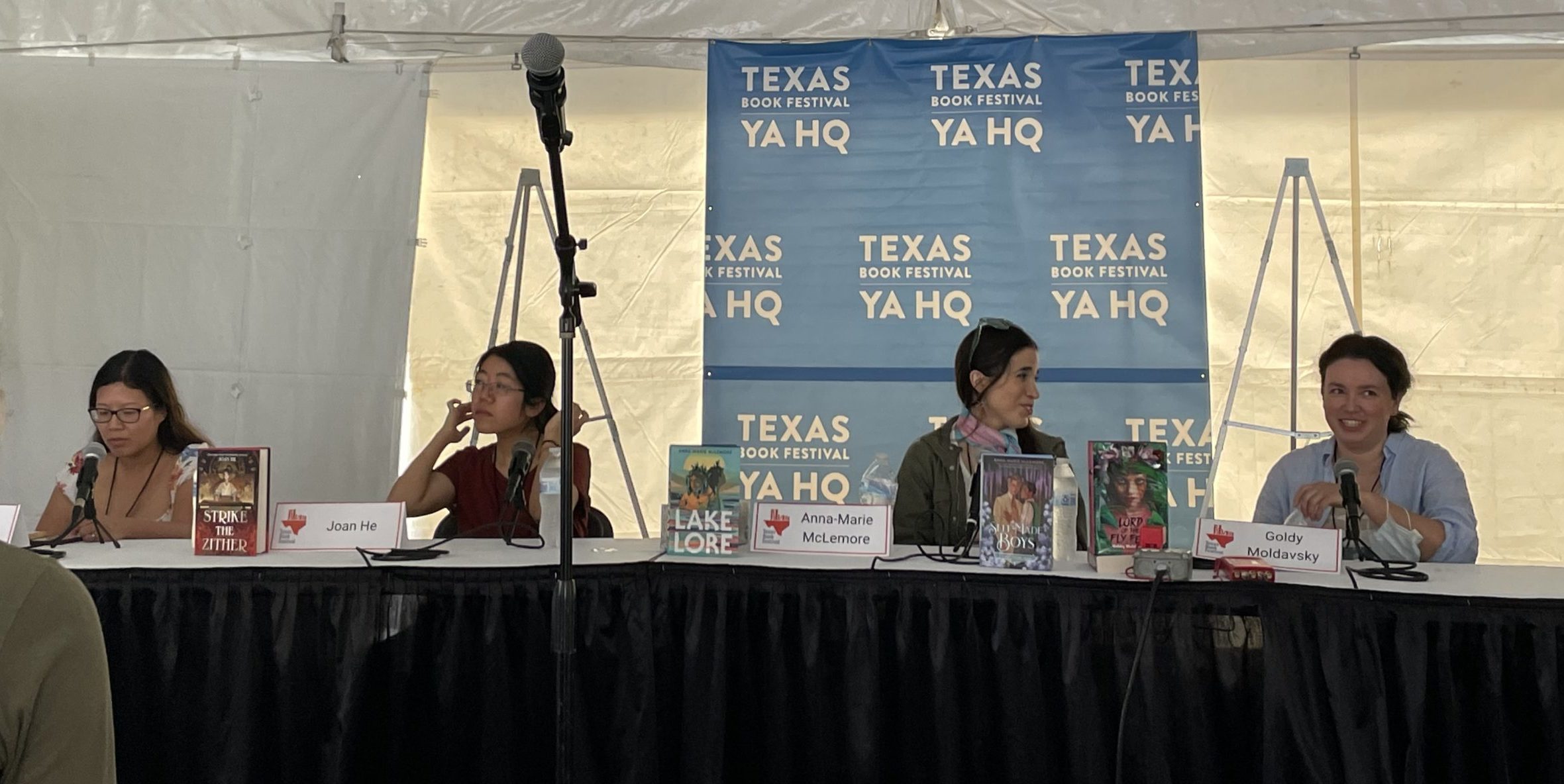
Considering everyone aside from Judy Lin had reimagined an already well-established story, Judy’s first question was why did these authors choose to retell a piece of literature, “I came to writing an adaptation of ‘Lord of the Flies’ kind of accidentally,” Goldy confesses, “As I was writing my first draft for this novel, I started to realize it was really similar to ‘Lord of the Flies’ already. I was kind of lost and directionless and I decided well why not make it a full adaptation? And so then, I started to go back and try to match the characters that I already had to the characters in the book. I sort of used it as a blueprint.” Anna-Marie, on the other hand, was propositioned by her team to do a retelling of “The Great Gatsby”, and Joan He felt as if despite the density of the original text “The Three Kingdoms” actually had a lot of archetypes and characters similar to those in high school cliques.
Given they all had to do retellings, and some weren’t set in the modern day, Judy then asked what was something surprising they encountered during their research, “I absolutely love research,” Anna-Marie began, “I usually do more than I will ever use for a story, just because I like immersing in what I’m writing about. Especially with writing a story in 1920s New York…I really wanted to focus on what being a trans guy would have been like, and what being queer would have been like. How would these characters have bound? You don’t have binders like you have now…Specifically related to 1920s fashion you had cis women trying to flatten their breasts to get the fringe and the beading to hang the way that they wanted it to. So, there were garments that I thought ‘you know, if I was a trans boy in this period I would have gotten the most boring version of this side lacer and just worn it and used it’. So, writing those kinds of things in.”
Meanwhile, Joan’s research on “The Three Kingdoms” was rather robust, “The classic is inspired by the Han Dynasty but luckily I didn’t research the Han Dynasty in depth, I just referenced the classic. So, I read both the abridged version and the full-length version…There were lots of interesting things that were actually cut out, like Liu Bei eats someone’s wife in the full one, and someone else plucks out his eyeball after he gets shot by an arrow and eats it too. It is a war book, so like lots of heads falling off, lots of eyeballs falling out. Besides that, I did also want to look at how it was being reimagined and adapted in other forms of media. So I watched lots of C Dramas and movies that are inspired by ‘The Three Kingdoms’.” The authors went over their individual writing processes, and chatted in detail about their books til the panel was over. Once it was done, the writers headed toward the Book Signing Tent.
Next wasn’t a panel at all, but a children’s event held in the Read Me A Story! Tent at 1 PM called Read Me a Story: Josefina’s Habichuelas / Las habichuelas de Josefina where Jasmine Mendez was set to read her debut picture book “Las Habichuelas de Josefina”. Jasmine was inspired by her Dominican roots and the lack of representation she saw in kids’ books, “When I had my daughter, who’s four now, I was looking for books by Dominican authors that might be able to teach her something about her culture. My husband’s Mexican American, so I was able to find a handful, cause there aren’t enough of those either, of Mexican American books or books related to Mexican culture. These books that are wonderful, rich with Mexican culture, Mexican American culture, TexMex culture, and all about food and celebrating that. And there was nothing like that about Dominican culture at all.”
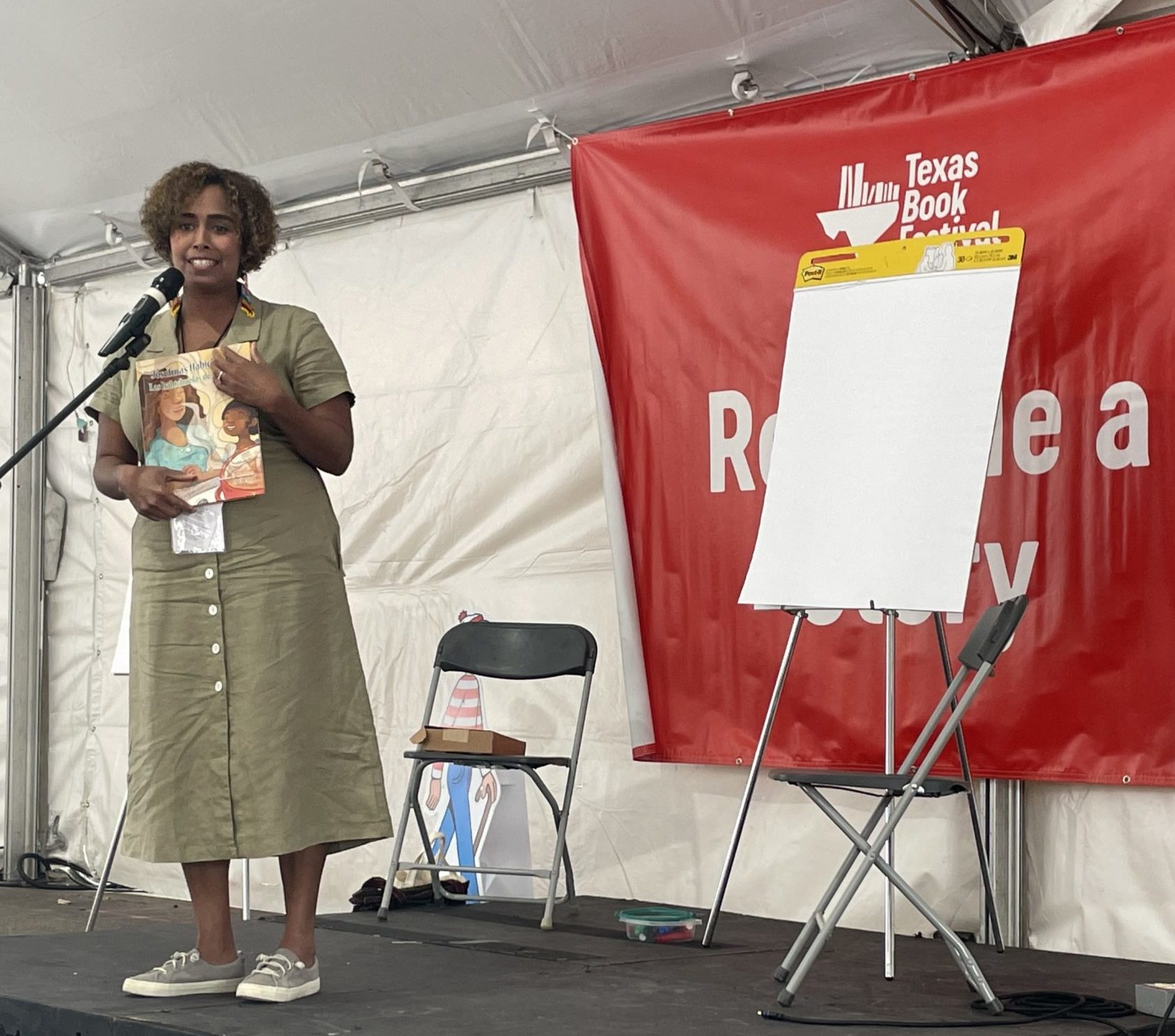
While there were plenty of overlapping dishes in Dominican, Puerto Rican, Caribbean, and Mexican cuisine, Jasmine wanted to find a dish that was wholly and solely Dominican. She did a ton of research and landed on Habichuelas con Dulce, or sweet beans. Originally, she wanted the story to be about the creation of Habichuelas con Dulce, but after looking into it extensively, she realized the story just didn’t exist. No one really knew where the beans came from. So, in her 30-minute time slot, Jasmine read the story she decided to go with. The tale of the adorable Josefina who, despite her sweet tooth, gives up sugary treats for lent. For 40 days and 40 nights, Josefina stays strong and refuses to eat any desserts. The one thing getting her through it? The idea that as lent ends Josefina’s mother is going to finally show her the laborious 2-day process of making Habichuelas con Dulce. She’s not just going to eat some sweets, she’s going to eat her favorite sweet treat.
Jasmine’s book is bilingual, written in both English and Spanish. At the end of the book is a long recipe for Habichuelas con Dulce just like the one Josefina and her family makes. Right after her reading, she headed straight for the Children’s Book Signing Tent.
The final panel of the day for Latinitas Magazine was in the Kirkus Review Tent at 2 PM On Assimilation, Lip Service, & Tokenism. This talk featured Tajja Isen, voice actor and author of “Some of My Best Friends: Essays on Lip Service”, Julissa Arce, journalist for such publications as The Huffington Post and author of “You Sound Like a White Girl: The Case for Rejecting Assimilation”, and Danielle Prescod, former Style Director for BET.com and author of “Token Black Girl”. Despite having different life experiences, their books told a similar story in that all these women, be it due to their race or ethnicity, felt the need to change themselves to better suit a society that preferred whiteness over diversity.
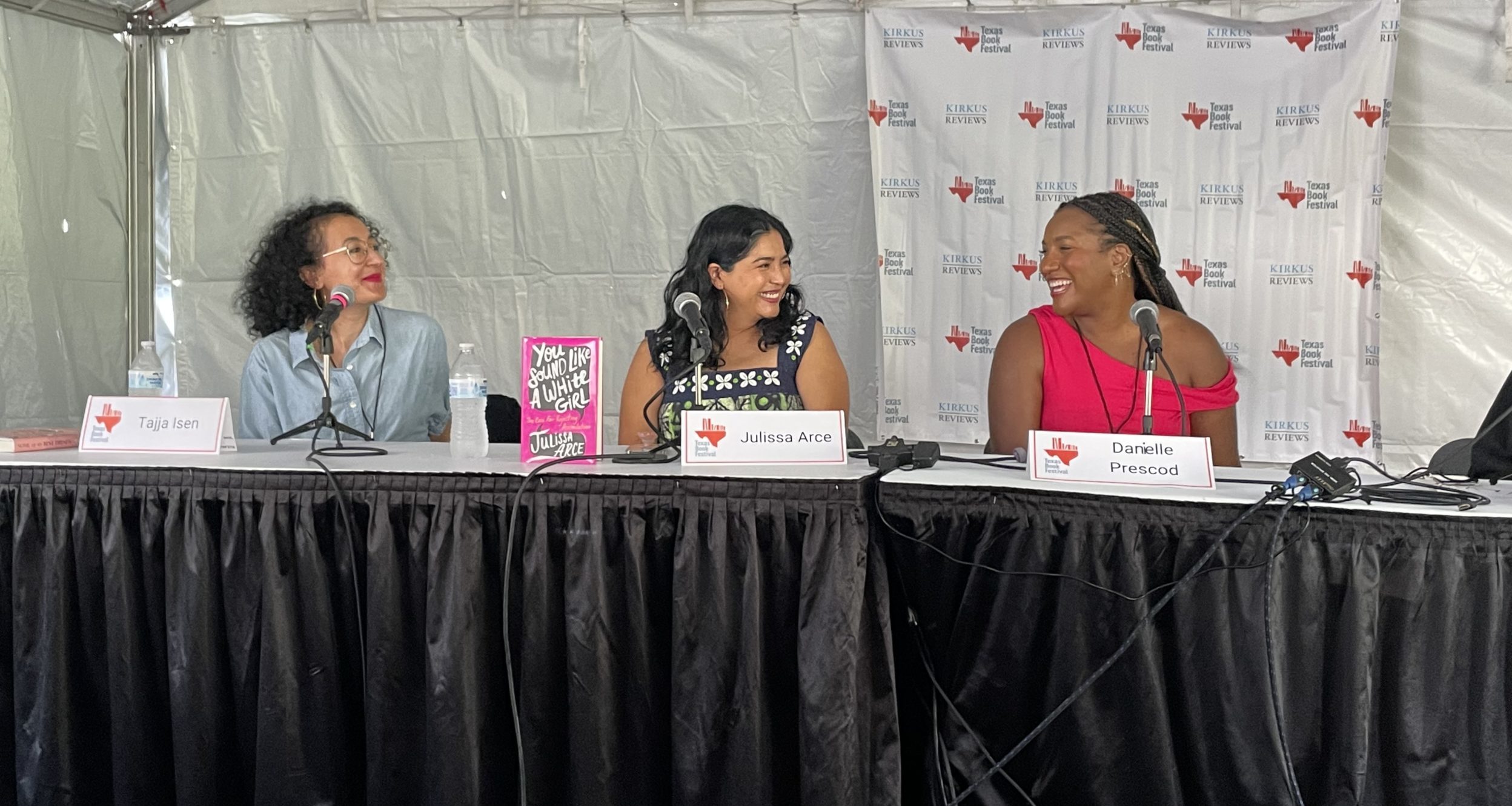
“It’s always weird to me to be at the steps of the capital and to think about all the things that I went through in Texas as an undocumented person.” Julissa Arce, three-time author, and three-time TBF visiter states, “My book ‘You Sound Like a White Girl’ is a rejection of assimilation. It’s a rejection that we have to central whiteness in our own lives to find success and to be accepted in this country. There’s a lot of history in this book. History that I wish I had learned when I was a student here in Texas. History that has really helped me to understand just how rooted I am in this country. The fact that Mexicans have been in this land since before it was called the United States, so if people say that we should go back to where we came from. We actually in fact already are.”
Journalist turned author and TBF first-timer Danielle Prescod echoed Julissa’s sentiments, “Similarly, my book is about assimilation. I grew up in New York, in a county called West Chester County. It’s a predominantly white, predominantly affluent county outside of New York City…On sort of a self-healing journey, I watched a movie from 1995, and that movie was ‘A Little Princess’ which was one of my favorite movies. And it started helping me piece together the fact that when I was a child all of the images that I saw of Black girls and Black women were subservient. Kind of secondary, but also in a very tokenized way. In a way that was really visible and that was projecting this kind of ideology that Blackness was accepted, but it was only conditionally accepted. Conditionally accepted if you choose to assimilate.”
Contrastingly, Tajja’s book isn’t a memoir at all, though it does take into account her experiences as a biracial Black woman. Instead, according to the description “Some of My Best Friends”, “explores the absurdity of living in a world that has grown fluent in the language of social justice but doesn’t always follow through”. Most often as it pertains to large companies and the film industry. The conversation the three women had was rich with meaning and importance. They spoke in depth about what it was like trying to placate their own cultures to make their white counterparts more comfortable. The pitfalls that that type of mentality will lead you to, as Julissa states, the world still sees you as Brown so the only one missing out is you. All of their books were available for purchase at the Book People tent and as soon as the talk was over, the women headed straight to the book signing.
All the books mentioned in this piece are currently available in person or online at Book People.


